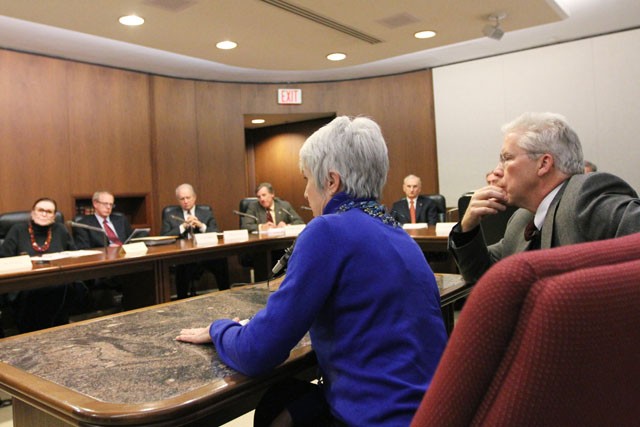For the 12 candidates vying for slots on the University of Minnesota Board of Regents, a Thursday orientation ramped up the intensity.
By late February the Joint Legislative Committee will nominate one candidate for each of the four open slots to be voted on by the full Minnesota legislature.
In the meantime, candidates move into a stage that Maureen Reed, former chair of the Board of Regents, described as âÄúhighly political, sometimes painfully partisanâÄù in her remarks during the orientation.
The orientation was meant to give the candidates guidance from a range of sources including the alumni association, legislators, and current board members, to prep them for a grueling campaign.
âÄúItâÄôs not something you can understand until youâÄôve gone through the vetting process,âÄù said current Regent Richard Beeson.
On the surface, the process involves delivering a presentation and meeting with legislators during the next five to six weeks. But the reality of conducting a successful candidacy is a little trickier.
Candidates were told to set up appointments with as many of the 29 members of the Joint Legislative Committee as possible in the next month. These legislators formally nominate candidates chosen by the Regent Candidate Advisory Council.
Yet Reed warned candidates they may get only five minutes of the busy legislatorsâÄô time.
âÄúHave an âÄòelevator speechâÄô prepared,âÄù Reed advised.
With a limited time frame to decide, legislators may look to âÄúopinion-makersâÄù in the candidateâÄôs congressional district to help inform their assessment.
Beeson also described how each legislator prioritizes a different set of issues resulting in an âÄúoverwhelming number of themesâÄù for the candidates to sort through.
The question remains what exactly the Legislature is seeking.
A published report created for the selection committee names essential criteria such as âÄúexperience in governing large organizations,âÄù and âÄúunderstanding of the higher education system in Minnesota.âÄù
Robert Kennedy, outgoing President of the University of Maine was nominated for, not one, but two, spots on the Board of Regents.
Asked how he planned to explain his qualifications to the Legislature, he said, âÄúIâÄôve been thinking of some strategy.âÄù
During a Q&A session, in addition to strategic concerns, candidates referred to controversial remarks made earlier in the presentation when candidates heard from Sen. Michelle Fischbach, R-Paynesville, and Rep. Bud Nornes , R-Fergus Falls.
Sen. Fischbach stated that there would not be any caucuses âÄî informal, partisan nominations in addition to the advisory council endorsed candidates âÄî as there have often been in the past.
Later in the meeting, the orientation chair, Jim Erickson, told the candidates to be prepared for caucuses. Regent candidate and former House Speaker Steven Sviggum defended Sen. FischbachâÄôs statement.
During the meeting, those candidates more experienced in governance stepped forward to give their opinions while other candidates listened intently or took notes.
According to Robert Ostlund, a candidate with strong administrative experience in K-12 education, âÄúYou donâÄôt worry about other [candidates].âÄù


